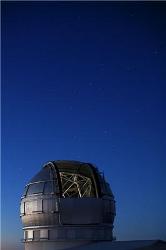Dec 4 2009
The CanariCam camera has seen first light after being pointed from the Gran Telescopio CANARIAS (GTC) at a star in the Whale Constellation. Now that is has been unveiled, commissioning of this heat-detecting instrument will begin in Spring Spring 2010, when its ability to "see" infrared light from stars and young planets will be tested.
 The Gran Telescopio CANARIAS pointing at the sky
The Gran Telescopio CANARIAS pointing at the sky
CanariCam’s "first heat" came from 20 Ceti, a bright star whose position in the sky makes it easy to observe for reasonable lengths of time. The star was observed at around 22.10 on the 18th November at the Observatorio del Roque de Los Muchachos, on the island of La Palma. "Although the image was not perfect, as is often the case with first light observations, to us it was as beatiful as a new born baby is to its parents," said Charles Telesco, Principal Investigator for the CanariCam at the University of Florida (United States), who toasted the birth in champagne with his colleagues.
CanariCam, which is about the size of a car engine, will work at the cutting edge of infrared astronomy. It will make a single night's observation at the GTC as productive as 40 days at a four metre telescope. It is the only instrument of its kind in its field and will be used to study magnetic fields in planetary systems and to detect small, cold planets that are difficult to find with other methods.
Grantecan Director Pedro Álvarez explains that "CanariCam is special because it is a very demanding instrument that will require high quality images from the telescope. With CanariCam the GTC will truly be able to work to its full potential." This initial installation at the telescope has been a baptism of fire, he says. It has confirmed the instrument’s basic technological capabilities but shown that more fine tuning is needed before CanariCam is ready for full scientific operation.
"These first trials, both in the laboratory and the first light observations, indicate that CanariCam is working well and indeed is exceeding our expectations," said Telesco. Although adjustment and commissioning of the instrument will not start at the telescope until Spring 2010, its automatic chopping-nodding mode was satisfactorily tested while the instrument was mounted at the GTC's Nasmyth platform and this assures us that the improvements in image quality we are seeking will be achieved.
CanariCam is currently in the GTC instrumentation laboratory waiting to be permanently installed at the telescope. Once it has been installed, each of its observing modes will be checked together with its optical, mechanical and electrical systems. Staff will also start to be trained in using the instrument. "This process, which will help us to understand the complex interaction between CanariCam, the GTC and the atmosphere, will deliver a truly exceptional infrared camera with which to explore the Universe with," added the Principal Investigator.
The CanariCam camera has been designed and built by the University of Florida. Engineers and researchers from the U.S. worked at the GTC for almost two weeks to assemble it. "The University of Florida has received news of CanariCam’s progress with huge enthusiasm and high expectations" said Rafael Guzman, Head of the University's Department of Astronomy. "Our astronomers are developing a programme to look at a range of topics that are currently attracting interest, like proto-planetary systems and super massive black holes." he added.